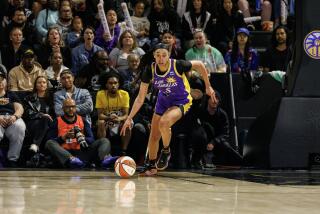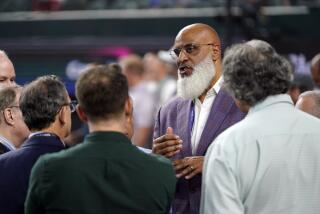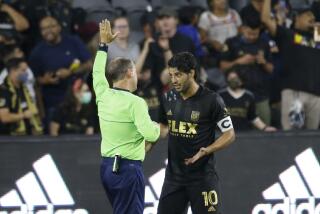NBA Owners Overwhelmingly Vote to Reopen Labor Contract
- Share via
As expected, NBA owners voted 27-2 Monday in Dallas to reopen the collective bargaining agreement, setting off what promises to be months of posturing and threats until next season looms and they get to the big question:
Will the league lose games to a labor action for the first time?
For the moment, Commissioner David Stern is back in his warm, fuzzy, lovable incarnation. But three years ago, angered by the players’ rejection of the deal he had reached with their union’s leadership, he locked them out all summer and brought them to their knees.
Monday, however, he issued no threats, purring that there were more pleasant ways of handling impasses.
“We’re in the process of setting up meetings that begin next week,” he said in a telephone press conference. “ . . . We’re in the process of hoping to sit down with our players to preserve and grow a system that produces over $1 billion of revenue to them, in salary and benefits.
“There are obviously some remedies that are available to both sides in a labor agreement, if they fail to reach an agreement--and those include allowing an expired agreement to continue, along with things like moratoriums and strikes and lockouts.
“But we think the better view here is to have those discussions . . . directly with our players’ association and leave it to others to speculate about the worst-case scenarios.”
Of course, Stern has reason to stay mellow. His calamitous projections, in which more than half the teams may post losses this season, are based on the last year of the network TV contract. Next season, the new deal kicks in, raising each team from $9 million a year to $22 million--and washing away a lot of red ink.
Stern’s reply: Unless they fix the system, the players will eat up all the new TV money.
But Stern has other problems. A small bloc of doves poses one he has never had to deal with--a resistance movement. The peace wing reportedly includes the three richest owners, Portland’s Paul Allen, Orlando’s Rick DeVos and Miami’s Mickey Arison, and one of the most influential, the Lakers’ Jerry Buss.
Moreover, as one small-market general manager noted, teams owned by networks or cable companies may be loath to rumble, since canceled games put holes in their programming.
Thus, the New York Knicks, owned by Cablevision, with NBC holding a piece; the Atlanta Hawks, owned by Ted Turner’s cable empire, and even such have-nots as the Denver Nuggets, a subsidiary of Ascent Entertainment, and Philadelphia 76ers, owned by Comcast, might rather settle than fight.
Then there are the teams in, or heading into new arenas, whose new “revenue streams” will enhance their bottom line. Thus, a team like the Indiana Pacers, with a huge payroll and a relatively small market, might not be such a hawk.
For its part, the union has its own reason to be circumspect. Rising anti-management forces among the membership will force the new director, Billy Hunter, to take a hard line, but there is a natural split in the group that Stern is sure to exploit.
Of the players, a full 19% play for the minimum salary, whereas 10 superstars--2% of the membership--take home 15% of the revenue.
Another 27 players make $5 million a year or more. The 37 highest-paid players--9% of the union--collect 32% of the revenue.
Stern reportedly will offer a “guild system,” multiplying the minimum--currently $272,500--for tenured veterans like Seattle’s Jerome Kersey and Orlando’s Gerald Wilkins. That would be a sure hit among 19% of the union members, giving the commissioner leverage to ask for something back.
If history is any guide, little will be accomplished before the contract runs out June 30.
After that, the tension will rise and the air will thicken. The owners will probably endorse a July 1 lockout but that’s another easy one, since it costs them nothing, and, as the summer of 1995 showed, shakes the players up.
They should then start to bargain in earnest before the scheduled opening of camps in early October. That’s how long we may have to wait to see who really stands with whom.
More to Read
All things Lakers, all the time.
Get all the Lakers news you need in Dan Woike's weekly newsletter.
You may occasionally receive promotional content from the Los Angeles Times.






